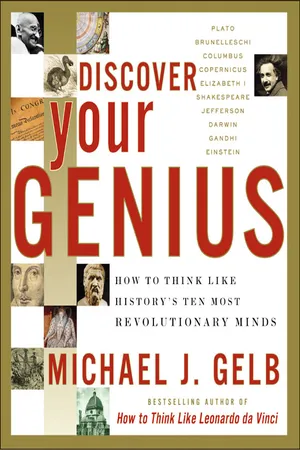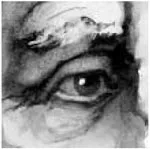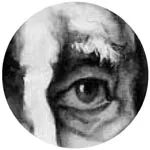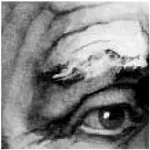
eBook - ePub
Discover Your Genius
Michael J. Gelb
This is a test
- 384 pages
- English
- ePUB (mobile friendly)
- Available on iOS & Android
eBook - ePub
Discover Your Genius
Michael J. Gelb
Book details
Book preview
Table of contents
Citations
About This Book
Unleash your creative potential.
Michael J. Gelb, bestselling author of How to Think Like Leonardo da Vinci, draws upon history's most revolutionary minds to help you unleash your own creativity. With fascinating biographies of all ten geniuses, personal self-assessments, and practical exercises, this book is the key to unlocking the genius inside you!
- Plato -- Deepening your love of wisdom
- Filippo Brunelleschi -- Expanding your perspective
- Christopher Columbus -- Strengthening your vision, optimism, and courage
- Nicolaus Copernicus -- Reorganizing your vision of the world
- Queen Elizabeth I -- Wielding your power with balance and effectiveness
- William Shakespeare -- Cultivating your emotional intelligence
- Thomas Jefferson -- Celebrating your freedom in the pursuit of happiness
- Charles Darwin -- Developing your powers of observation and cultivating an open mind
- Mahatma Gandhi -- Applying the principles of spiritual genius to harmonize spirit, mind, and body
- Albert Einstein -- Unleashing your imagination and "combinatory play"
Frequently asked questions
How do I cancel my subscription?
Can/how do I download books?
At the moment all of our mobile-responsive ePub books are available to download via the app. Most of our PDFs are also available to download and we're working on making the final remaining ones downloadable now. Learn more here.
What is the difference between the pricing plans?
Both plans give you full access to the library and all of Perlego’s features. The only differences are the price and subscription period: With the annual plan you’ll save around 30% compared to 12 months on the monthly plan.
What is Perlego?
We are an online textbook subscription service, where you can get access to an entire online library for less than the price of a single book per month. With over 1 million books across 1000+ topics, we’ve got you covered! Learn more here.
Do you support text-to-speech?
Look out for the read-aloud symbol on your next book to see if you can listen to it. The read-aloud tool reads text aloud for you, highlighting the text as it is being read. You can pause it, speed it up and slow it down. Learn more here.
Is Discover Your Genius an online PDF/ePUB?
Yes, you can access Discover Your Genius by Michael J. Gelb in PDF and/or ePUB format, as well as other popular books in Personal Development & Creativity. We have over one million books available in our catalogue for you to explore.
Information
Topic
Personal DevelopmentSubtopic
CreativityPlato
(CIRCA 428–328 B.C.)
Deepening Your Love of Wisdom
Beauty is truth, truth beauty . . .
—JOHN KEATS
Think for a moment of the teachers who have had the most lasting and profound impact on you. Chances are, they helped you see the essence of something dear to you for the first time, or inspired you to cultivate a lasting love for that subject, or perhaps instilled in you ideals that are still with you today. If you were lucky enough to have had such influential teachers in your life, you know the feelings of warmth and gratitude their memories evoke, for they set you on the path toward becoming the person you want to be.

Plato set the table for the feast of the Western intellectual dialogue; one twentieth-century philosopher went so far as to characterize the subsequent Western philosophical tradition as consisting “by and large of footnotes to Plato.” The underlying premise that informed the writing of this book—that each of us, yourself included, possesses a divine spark that can be awakened and nurtured into a full expression of our spiritual and creative gifts—is itself a neo-Platonic assumption. Even Leonardo da Vinci was expressing an essentially Platonic notion when he wrote in his notebook, “The desire to know is natural to good men,” and “For in truth great love is born of great knowledge of the thing loved.” In fact, Plato was the central influence of the classical wisdom whose rebirth marked the Renaissance that Leonardo personified.
There is an eye of the soul which is more precious than ten-thousand bodily eyes, for by it alone is truth seen.
—Plato

TEACHER AND STUDENT
Plato’s birth into a distinguished and politically well-connected Athenian family came near the onset of the Peloponnesian War. The war exacerbated an atmosphere of political turmoil in his homeland that lasted until he was in his early twenties. Originally oriented to a career in politics, Plato became disenchanted by the cutthroat struggle for power between the oligarchic and democratic factions in Athens. As he wrote, “I was disgusted and drew back from the wickedness of the times.”
Plato’s uncles and older brothers had studied with Socrates before his birth, so we can be reasonably sure that he was exposed as a child to the teachings of the master. And it is with Socrates that an appreciation of Plato must begin. Born in Athens in 469 B.C., Socrates dedicated his life primarily to the pursuit of moral goodness and the search for truth.
When one of his friends asked the Oracle at Delphi whether anyone was wiser than Socrates, the Oracle replied: “NO.” Socrates overcame his embarrassment at being considered the wisest man of his time by interpreting the distinction as recognition of his most important knowledge: the knowledge of his own ignorance. He believed that the Oracle’s intention was to bring him and others closer to goodness and truth by helping them realize their fundamental ignorance of these essentials. Rejecting the mantle of “expert” or even “teacher,” Socrates practiced profound intellectual humility, describing himself as a “midwife of ideas.”
The process of the questing mind, critical and open, is the core of the Socratic approach. Socrates embodied the Delphic command to “know thyself.” His admonition, “The unexamined life is not worth living” is the point of departure for anyone who seeks wholeness and enlightenment. Socrates believed that happiness was to be achieved not through external achievement, material wealth, or status, but rather through living a life that nurtures one’s soul.
Socrates found his finest student in Plato, but their relationship was cut short when the Athenian democratic government sentenced Socrates to death in 399 B.C., on what Plato called “a monstrous charge, the last that could be made against him, the charge of impiety.” His disillusionment with Athens at its worst, Plato left for years of study abroad, seeking recourse through philosophy—literally, “the love of wisdom,” from the Greek roots philein meaning “loving” and sophia meaning “wise.” As “law and morality were deteriorating at an alarming rate,” he wrote, he was ultimately “forced . . . to the belief that the only hope of finding justice for society or for the individual lay in true philosophy.”
PLATO’S RENAISSANCE
In 1486, at the age of twenty-three, Pico della Mirandola asserted his stature as one of the high priests of Plato’s renaissance when he presented his remarkable “Oration on the Dignity of Man,” a neo-Platonic perspective on creation that is as inspiring to students of human potential today as it was when first presented more than 500 years ago. In it Pico proclaims that we humans, unlike other creatures, have unlimited potential to create our own stature in life. He writes:
“Neither an established place, nor a form belong to you alone, nor any special function we have given you, O Adam, and for this reason, that you have and possess, according to your desire and judgment, whatever place, whatever form, and whatever functions you shall desire. The nature of other creatures, which has been determined, is confined within the bounds prescribed by us. You, who are confined by no limits, shall determine for yourself your own nature, in accordance with your own free will, in whose hand I have placed you.
“I have set you at the center of the world, so that from there you may more easily survey whatever is in the world. We have made you neither heavenly nor earthly, neither mortal nor immortal, so that, you may fashion yourself in whatever form you shall prefer. You should be able to descend among the lower forms of being, which are brute beasts; you shall be able to be reborn out of the judgment of your own soul into the higher beings, which are divine.”
A PHILOSOPHY OF KNOWLEDGE
Plato’s love of wisdom is best appreciated by considering his fundamental philosophy of knowledge on which his political, educational, and moral philosophy are all based. Of course, a full understanding of the ideas that Plato developed and expressed through his celebrated dialogues would require a lifetime of scholarly inquiry. Nevertheless, his most important idea, and the famous metaphor with which he chose to express it, reveal more than a glimpse of his genius.
In Plato’s view, the world we experience is a pale reflection of an ideal world, a permanent and unchanging realm he calls the world of Forms. Our everyday world is changing constantly, with everything in it a mere impermanent expression of its true essence, which resides in the world of Forms. For example, in your hand you hold a book, but it is only because you know the eternal essence, or form, of “bookness” that you are able to recognize this particular book. Similarly, you recognize an apple or a cat as a manifestation of the ideal form of “appleness” or “catness.”
According to the Neo-Platonists, since the self shares the same structure as the world, by knowing the self, one can know the world.
—PROFESSOR ROGER PADEN ON THE NEO-PLATONIC LOVE OF WISDOM
The world of Forms is hierarchically organized, with Beauty, Truth, and Goodness at the top of the hierarchy. Plato reasoned that before birth all human souls have access to the world of pure beauty, truth, and goodness but that when we are born, we forget. The philosopher’s mission is to lead the way back to the beauty, truth, and goodness we have forgotten.
Imagine a perfect circle.
We can conceive the form of a perfect circle and the circle can be formally defined as pi r squared (πr2).
Now draw a circle. As you draw you will introduce imperfections. Even Leonardo and Michelangelo drew imperfect circles. And a computer can’t draw a perfect circle either, because its pixels aren’t perfect.
Nevertheless, the ideal form of the perfect circle is known to us, Plato would say, from before birth.
In book seven of The Republic Plato introduces his most famous metaphor for the world of forms and its relation to our everyday experience: “I want you to go on to picture the enlightenment or ignorance of our human condition somewhat as follows. Imagine an underground chamber, like a cave with an entrance open to the daylight and running a long way underground. In this chamber are men who have been prisoners there since they were children, their legs and necks being so fastened that they can only look straight ahead of them and cannot turn their heads.”

For Plato, it is the philosopher who overcomes his fear, breaks his chains, and ventures out of the cave to seek the light. And it is love, of wisdom, goodness, truth, and beauty, that is the philosopher’s driving force. Plato’s true philosopher, who escapes the cave and knows the light of the form of the Good, also returns to guide others to enlightenment.
THE POWER OF LOVE
[Beauty] is eternal, unproduced, indestructible; neither subject to increase or decay . . . All other things are beautiful through a participation of it . . . This is the divine and pure . . . the beautiful itself.
—PLATO

The concept of love that Plato saw as so central to enlightenment is different from the love of which we speak so casually today. When Plato speaks of the “love of wisdom,” he really means it. For Plato, passionate love of beauty, truth, and goodness was the way out of the cave. This loving force, known to the Greeks as Eros, may begin with physical desire and personal affection but evolves to a more universal, spiritual plane. (Thus the contemporary phrase “Platonic relationship,” though typically used to suggest that a relationship is not carnal, actually refers to a friendship based on the pursuit and shared recognition of pure truth, beauty, and goodness.)
Love is expressed through rigorous work in Plato’s world; disciplined study and intensive training in reasoning are prerequisites for understanding true knowledge, Still, the process by which Plato suggests we experience a full realization of the form of the Good bears some resemblance to a romantic consummation. Describing oneness with the form of the Good, he writes: “If the lover is attuned to the object with which he would be united, the result is delight, pleasure and satisfaction. When the lover is united with the one he loves, he finds peace; relieved of his burden, he finds rest.” And speaking through Socrates’ voice in the Symposium, Plato emphasizes that “human nature will not easily find a better helper than love.”

THE PLATO OF THE EAST
(551–479 B.C.)
Kung Fu Tse, known as Confucius, is the seminal figure of Chinese philosophy. His practice of the love of wisdom was so influential that his teachings were outlawed by the Communists more than two millennia after they were introduced. Like Plato, he was an idealist concerned with the nature of virtue, social order, and education. His formulation of the Golden Rule—“What you do not wish done to yourself, do not do to others”—represents a revolutionary development in human thought. Five hundred years before the birth of Christianity he taught: “Acknowledge benefits by the return of benefits, but refrain from revenging injuries,” and he urged Chinese citizens to “love your neighbor as yourself.” Confucius came to these principles not through revelation or mysticism, but rather through the power of reasoning.
THE GENIUS WITHIN
Plato returned to Athens for his crowning achievement: the creation in 379 B.C. of the Academy, the first university in the Western world. If Platonism were a religion, then learning and teaching would be its forms of worship, and the Academy would be its temple. Entrance to it was predicated on successful completion of what we now call elementary and secondary education. Although information about specialized subjects was included in the curriculum, the primary focus of a Platonic education was “reminding” the student of the knowledge inherent in the human soul.
Plato reasoned that the most important knowledge was already inside the student. Therefore, the role of the teacher was to facilitate the student’s realization of this inner knowing through Socratic questio...